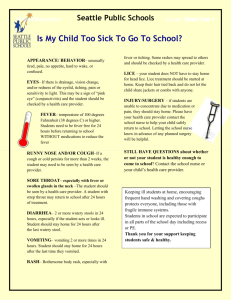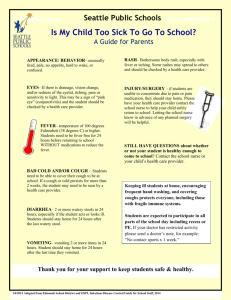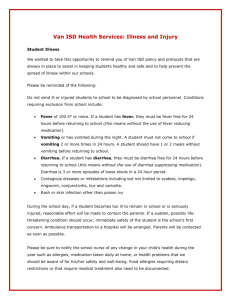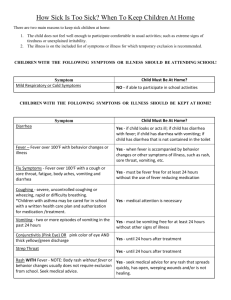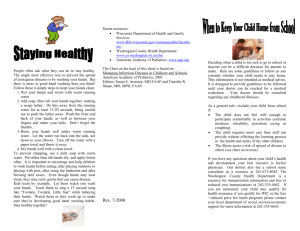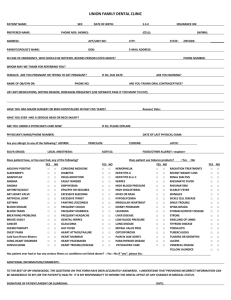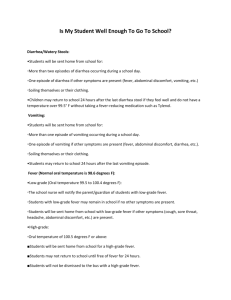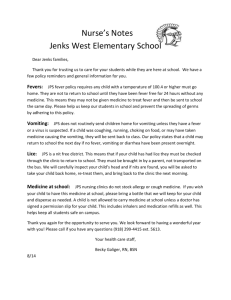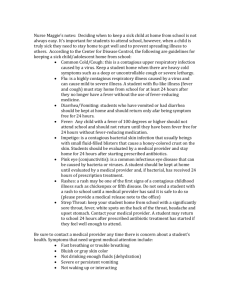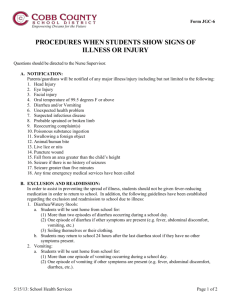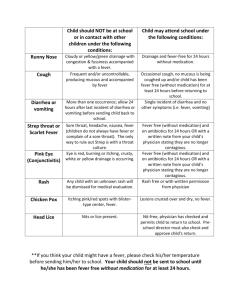When Your Child Doesn`t Feel Well! Parents often struggle with the
advertisement
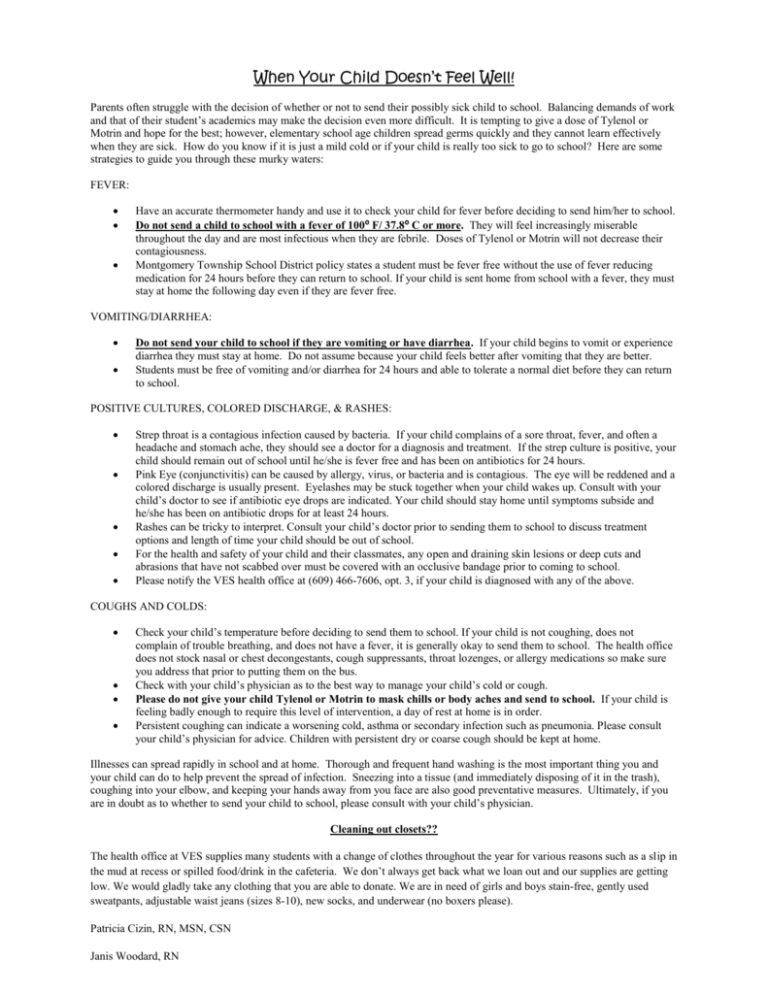
When Your Child Doesn’t Feel Well! Parents often struggle with the decision of whether or not to send their possibly sick child to school. Balancing demands of work and that of their student’s academics may make the decision even more difficult. It is tempting to give a dose of Tylenol or Motrin and hope for the best; however, elementary school age children spread germs quickly and they cannot learn effectively when they are sick. How do you know if it is just a mild cold or if your child is really too sick to go to school? Here are some strategies to guide you through these murky waters: FEVER: Have an accurate thermometer handy and use it to check your child for fever before deciding to send him/her to school. Do not send a child to school with a fever of 100⁰ F/ 37.8⁰ C or more. They will feel increasingly miserable throughout the day and are most infectious when they are febrile. Doses of Tylenol or Motrin will not decrease their contagiousness. Montgomery Township School District policy states a student must be fever free without the use of fever reducing medication for 24 hours before they can return to school. If your child is sent home from school with a fever, they must stay at home the following day even if they are fever free. VOMITING/DIARRHEA: Do not send your child to school if they are vomiting or have diarrhea. If your child begins to vomit or experience diarrhea they must stay at home. Do not assume because your child feels better after vomiting that they are better. Students must be free of vomiting and/or diarrhea for 24 hours and able to tolerate a normal diet before they can return to school. POSITIVE CULTURES, COLORED DISCHARGE, & RASHES: Strep throat is a contagious infection caused by bacteria. If your child complains of a sore throat, fever, and often a headache and stomach ache, they should see a doctor for a diagnosis and treatment. If the strep culture is positive, your child should remain out of school until he/she is fever free and has been on antibiotics for 24 hours. Pink Eye (conjunctivitis) can be caused by allergy, virus, or bacteria and is contagious. The eye will be reddened and a colored discharge is usually present. Eyelashes may be stuck together when your child wakes up. Consult with your child’s doctor to see if antibiotic eye drops are indicated. Your child should stay home until symptoms subside and he/she has been on antibiotic drops for at least 24 hours. Rashes can be tricky to interpret. Consult your child’s doctor prior to sending them to school to discuss treatment options and length of time your child should be out of school. For the health and safety of your child and their classmates, any open and draining skin lesions or deep cuts and abrasions that have not scabbed over must be covered with an occlusive bandage prior to coming to school. Please notify the VES health office at (609) 466-7606, opt. 3, if your child is diagnosed with any of the above. COUGHS AND COLDS: Check your child’s temperature before deciding to send them to school. If your child is not coughing, does not complain of trouble breathing, and does not have a fever, it is generally okay to send them to school. The health office does not stock nasal or chest decongestants, cough suppressants, throat lozenges, or allergy medications so make sure you address that prior to putting them on the bus. Check with your child’s physician as to the best way to manage your child’s cold or cough. Please do not give your child Tylenol or Motrin to mask chills or body aches and send to school. If your child is feeling badly enough to require this level of intervention, a day of rest at home is in order. Persistent coughing can indicate a worsening cold, asthma or secondary infection such as pneumonia. Please consult your child’s physician for advice. Children with persistent dry or coarse cough should be kept at home. Illnesses can spread rapidly in school and at home. Thorough and frequent hand washing is the most important thing you and your child can do to help prevent the spread of infection. Sneezing into a tissue (and immediately disposing of it in the trash), coughing into your elbow, and keeping your hands away from you face are also good preventative measures. Ultimately, if you are in doubt as to whether to send your child to school, please consult with your child’s physician. Cleaning out closets?? The health office at VES supplies many students with a change of clothes throughout the year for various reasons such as a slip in the mud at recess or spilled food/drink in the cafeteria. We don’t always get back what we loan out and our supplies are getting low. We would gladly take any clothing that you are able to donate. We are in need of girls and boys stain-free, gently used sweatpants, adjustable waist jeans (sizes 8-10), new socks, and underwear (no boxers please). Patricia Cizin, RN, MSN, CSN Janis Woodard, RN
